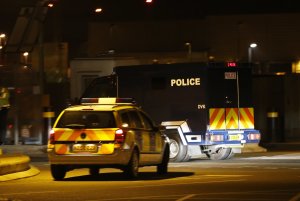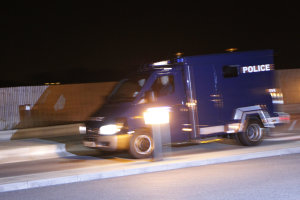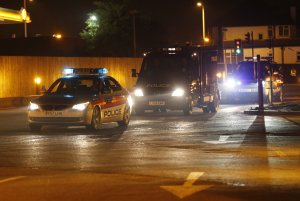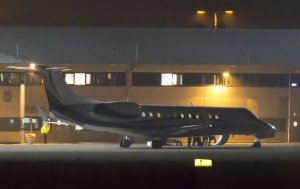by: JAMAL HALABY
AMMAN, Jordan (AP) — A radical Muslim preacher suspected of being a key al-Qaida operative in Europe arrived in Jordan on Sunday to face retrial on terrorism charges after his deportation from Britain, officials said, ending a decade-long legal battle over his fate.
The return of 53-year-old Abu Qatada was viewed as a victory in Jordan, whose 2001 extradition request was blocked in British and European courts for more than a decade over human rights concerns. Britain and Jordan ratified a treaty on torture aimed at easing those worries, clearing the way for his deportation.
Jordan convicted Abu Qatada in absentia on terrorism charges and sentenced him to life in prison in 1999, but that has been lifted now that he faces a new trial.
Jordanian Information Minister Mohammed Momani said the kingdom "is keen on credibility and transparency" in handling Abu Qatada, whose real name is Omar Mahmoud Mohammed Othman. The deportation of the Palestinian-born Jordanian cleric, Momani said, "sends a message to all fugitives that they will face justice in Jordan."
Abu Qatada arrived at Amman's civilian airport on a British aircraft and was whisked in a green SUV, escorted by a 12-car convoy, with masked anti-terrorism police to the nearby premises of the military State Security Court on the outskirts of the Jordanian capital. Police sealed off the street as the convoy drove against traffic to the court building, just across the street from the airport. A crush of journalists was kept at bay by armed policemen.
Abu Qatada's father, Mahmoud, and an unidentified relative stood at the entrance of the court building, but were not allowed to enter.
"I have nothing to say, except that my son is innocent and I hope the court will set him free," the father told the Associated Press.
The military prosecutor began questioning Abu Qatada on terrorism-related charges in the presence of his lawyer, Tayseer Thiab, according to one of the prosecutors involved. The military district attorney banned the publication of the prosecutors' names.
No other details were immediately available.
In London, British Home Secretary Theresa May had announced Abu Qatada's departure in a statement, expressing confidence that the U.K. public would welcome the conclusion of efforts dating back to 2001 to remove the radical cleric.
"This dangerous man has now been removed from our shores to face the courts in his own country," May said. The Home Office then posted a picture on Twitter of Abu Qatada climbing the steps of a plane.
Britain had tried since 2001 to deport Abu Qatada, but courts had blocked extradition over concerns that evidence obtained under torture could be used against him.
After years of successfully fighting the numerous attempts to expel him from the U.K., Abu Qatada recently indicated he would voluntarily return to Jordan if it and Britain ratified a treaty on torture.
That treaty — which explicitly bans the use of evidence "where there are serious and credible allegations that a statement from a person has been obtained by torture or ill-treatment" — was ratified by Britain and Jordan last month.
It paved the way for the long-awaited removal of the man described in courts in Britain and Spain as a senior al-Qaida figure in Europe who had close ties to the late Osama bin Laden.
In 1999, a Jordanian military court sentenced Abu Qatada to death in absentia for conspiracy to carry out terror attacks, including a plot on the country's American school in Amman. But the sentence was immediately commuted to life in jail with hard labor.
In 2000, the same court sentenced him to 15 years for plotting to carry out terror attacks on Israeli and American tourists and Western diplomats during the country's millennium celebrations.
In both trials, Abu Qatada was in London, where he entered on a forged passport in 1993 and was granted asylum a year later.
Britain accused Abu Qatada of links with Zacarias Moussaoui, the only person charged in the United States over the Sept. 11, 2001, terrorist attacks, and with shoe bomber Richard Reid. Audio recordings of some of the cleric's sermons were found in an apartment in Hamburg, Germany, used by some of the Sept. 11 hijackers.
British authorities first tried to deport Abu Qatada in 2001, then detained him in 2002 under anti-terrorism laws, which at the time allowed suspected terrorists to be jailed without charge.
Though he was released in 2005 when the unpopular law was overturned, the cleric was kept under close surveillance and detained in various ways. He most recently was being held at London's Belmarsh prison after breaching a bail condition in March which restricted the use of mobile phones and communication devices.
The British home secretary acknowledged the delays in the legal process in her statement announcing that "at last" Abu Qatada had been deported, saying it is "clear that we need to make sense of our human rights laws and remove the many layers of appeals available to foreign nationals we want to deport."
Associated Press writer Cassandra Vinograd in London contributed to this report.
AMMAN, Jordan (AP) — A radical Muslim preacher suspected of being a key al-Qaida operative in Europe arrived in Jordan on Sunday to face retrial on terrorism charges after his deportation from Britain, officials said, ending a decade-long legal battle over his fate.
The return of 53-year-old Abu Qatada was viewed as a victory in Jordan, whose 2001 extradition request was blocked in British and European courts for more than a decade over human rights concerns. Britain and Jordan ratified a treaty on torture aimed at easing those worries, clearing the way for his deportation.
Jordan convicted Abu Qatada in absentia on terrorism charges and sentenced him to life in prison in 1999, but that has been lifted now that he faces a new trial.
Jordanian Information Minister Mohammed Momani said the kingdom "is keen on credibility and transparency" in handling Abu Qatada, whose real name is Omar Mahmoud Mohammed Othman. The deportation of the Palestinian-born Jordanian cleric, Momani said, "sends a message to all fugitives that they will face justice in Jordan."
Abu Qatada arrived at Amman's civilian airport on a British aircraft and was whisked in a green SUV, escorted by a 12-car convoy, with masked anti-terrorism police to the nearby premises of the military State Security Court on the outskirts of the Jordanian capital. Police sealed off the street as the convoy drove against traffic to the court building, just across the street from the airport. A crush of journalists was kept at bay by armed policemen.
Abu Qatada's father, Mahmoud, and an unidentified relative stood at the entrance of the court building, but were not allowed to enter.
"I have nothing to say, except that my son is innocent and I hope the court will set him free," the father told the Associated Press.
The military prosecutor began questioning Abu Qatada on terrorism-related charges in the presence of his lawyer, Tayseer Thiab, according to one of the prosecutors involved. The military district attorney banned the publication of the prosecutors' names.
No other details were immediately available.
In London, British Home Secretary Theresa May had announced Abu Qatada's departure in a statement, expressing confidence that the U.K. public would welcome the conclusion of efforts dating back to 2001 to remove the radical cleric.
"This dangerous man has now been removed from our shores to face the courts in his own country," May said. The Home Office then posted a picture on Twitter of Abu Qatada climbing the steps of a plane.
Britain had tried since 2001 to deport Abu Qatada, but courts had blocked extradition over concerns that evidence obtained under torture could be used against him.
After years of successfully fighting the numerous attempts to expel him from the U.K., Abu Qatada recently indicated he would voluntarily return to Jordan if it and Britain ratified a treaty on torture.
That treaty — which explicitly bans the use of evidence "where there are serious and credible allegations that a statement from a person has been obtained by torture or ill-treatment" — was ratified by Britain and Jordan last month.
It paved the way for the long-awaited removal of the man described in courts in Britain and Spain as a senior al-Qaida figure in Europe who had close ties to the late Osama bin Laden.
In 1999, a Jordanian military court sentenced Abu Qatada to death in absentia for conspiracy to carry out terror attacks, including a plot on the country's American school in Amman. But the sentence was immediately commuted to life in jail with hard labor.
In 2000, the same court sentenced him to 15 years for plotting to carry out terror attacks on Israeli and American tourists and Western diplomats during the country's millennium celebrations.
In both trials, Abu Qatada was in London, where he entered on a forged passport in 1993 and was granted asylum a year later.
Britain accused Abu Qatada of links with Zacarias Moussaoui, the only person charged in the United States over the Sept. 11, 2001, terrorist attacks, and with shoe bomber Richard Reid. Audio recordings of some of the cleric's sermons were found in an apartment in Hamburg, Germany, used by some of the Sept. 11 hijackers.
British authorities first tried to deport Abu Qatada in 2001, then detained him in 2002 under anti-terrorism laws, which at the time allowed suspected terrorists to be jailed without charge.
Though he was released in 2005 when the unpopular law was overturned, the cleric was kept under close surveillance and detained in various ways. He most recently was being held at London's Belmarsh prison after breaching a bail condition in March which restricted the use of mobile phones and communication devices.
The British home secretary acknowledged the delays in the legal process in her statement announcing that "at last" Abu Qatada had been deported, saying it is "clear that we need to make sense of our human rights laws and remove the many layers of appeals available to foreign nationals we want to deport."
Associated Press writer Cassandra Vinograd in London contributed to this report.




No comments:
Post a Comment